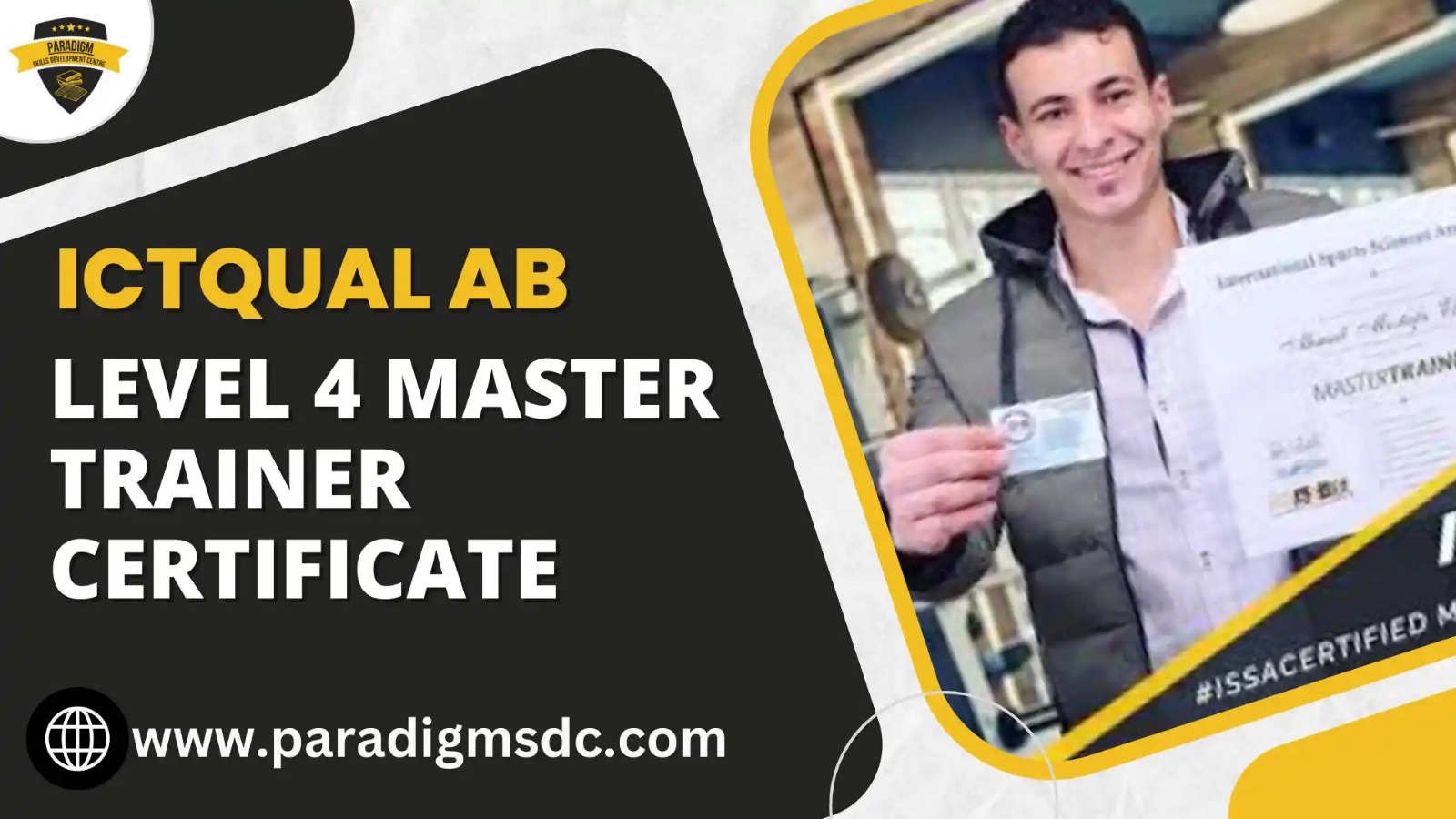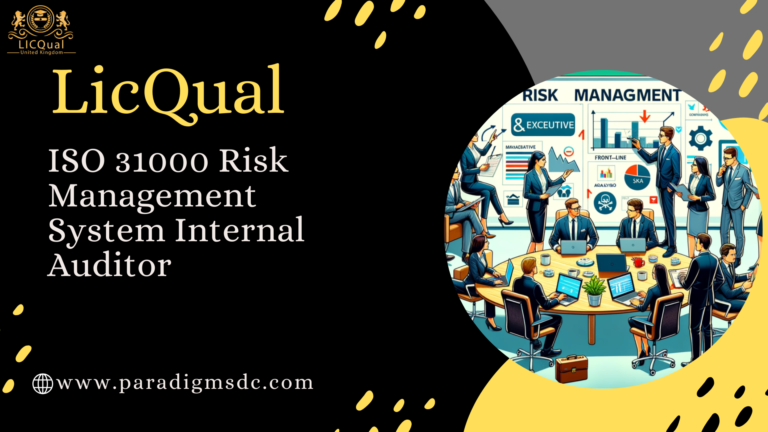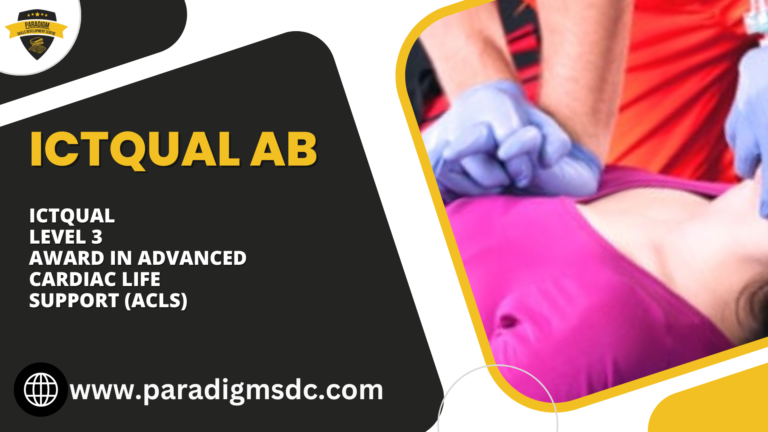Course Introduction
The ICTQual Level 4 Master Trainer Certificate is a prestigious qualification designed for professionals aiming to excel in the field of training and development. This advanced program is tailored to enhance participants’ training expertise, equipping them with the knowledge and skills needed to deliver impactful and effective training across various disciplines.
Course Overview
The ICTQual Level 4 Master Trainer Certificate offers a comprehensive overview of advanced training methodologies, instructional design principles, and leadership in training. Participants will delve into the intricacies of adult learning theories, training needs analysis, and advanced facilitation techniques, preparing them to design and deliver training programs that meet organizational objectives and learner needs effectively.
Course Study Units
- Foundations of Education and Training:
- Teaching and Learning Strategies:
- Assessment Practices:
- Quality Assurance in Education:
- Curriculum Development:
- Professional Development and Reflective Practice:
- Capstone Project or Portfolio:
Learning Outcomes
Upon completion of the ICTQual Level 4 Master Trainer Certificate, participants will be able to:
- Foundations of Education and Training:
- Understand the historical and philosophical foundations of education.
- Analyze the role of education in society and its impact on individuals and communities.
- Explore current trends, challenges, and debates in the field of education.
- Identify key stakeholders in education and their roles and responsibilities.
- Reflect on personal beliefs and values about education and teaching.
- Teaching and Learning Strategies:
- Apply diverse pedagogical approaches and methods to engage learners effectively.
- Design lesson plans that align with learning objectives and cater to diverse learning styles and needs.
- Implement technology tools and resources to enhance teaching and learning experiences.
- Foster an inclusive and supportive learning environment that promotes active participation and collaboration.
- Evaluate the effectiveness of teaching strategies and make adjustments based on feedback and reflection.
- Assessment Practices:
- Differentiate between various types of assessment (formative, summative, diagnostic, etc.) and their purposes.
- Develop valid and reliable assessment tools that align with learning objectives and standards.
- Analyze assessment data to monitor student progress and inform instructional decision-making.
- Provide constructive feedback to students to support their learning and growth.
- Implement strategies to ensure fairness, reliability, and validity in assessment practices.
- Quality Assurance in Education:
- Understand the concept and importance of internal quality assurance (IQA) in education and training.
- Identify quality assurance frameworks, standards, and procedures relevant to educational settings.
- Implement quality assurance processes to monitor and evaluate teaching, assessment, and learning activities.
- Identify areas for improvement and develop strategies for continuous quality enhancement.
- Promote a culture of excellence and accountability within educational institutions.
- Curriculum Development:
- Demonstrate an understanding of curriculum design principles and models.
- Develop curriculum documents that are aligned with learning outcomes, standards, and assessment practices.
- Adapt curriculum to meet the needs of diverse learners and address emerging trends in education.
- Evaluate and revise curriculum based on feedback, assessment data, and stakeholder input.
- Collaborate with colleagues and stakeholders to ensure coherence and alignment across curriculum components.
- Professional Development and Reflective Practice:
- Engage in ongoing professional development activities to enhance teaching practice and subject knowledge.
- Reflect critically on personal teaching experiences, challenges, and successes.
- Set professional goals and develop action plans for continuous improvement.
- Seek feedback from peers, mentors, and supervisors to inform reflective practice.
- Demonstrate a commitment to lifelong learning and growth as an educator.
- Capstone Project or Portfolio:
- Apply knowledge and skills acquired throughout the program to a real-world educational context.
- Demonstrate proficiency in teaching, assessment, and quality assurance through the completion of a comprehensive project or portfolio.
- Showcase evidence of learning, teaching materials, assessment tools, and quality assurance initiatives.
- Communicate findings and insights effectively through written reports, presentations, or other media.
- Reflect on the overall learning journey and identify areas of personal and professional growth.
Course Benefits
- Expertise Development: Enhance your skills as a master trainer and instructional designer.
- Career Advancement: Expand your career opportunities in training, education, and organizational development.
- Impactful Training: Design and deliver training programs that drive organizational success and employee development.
- Professional Recognition: Earn a prestigious qualification that demonstrates your expertise in training and development.
- Networking Opportunities: Connect with other training professionals and leaders in the field.
Who is this Course For?
The ICTQual Level 4 Master Trainer Certificate is ideal for:
- Experienced trainers and educators seeking to advance their training skills.
- HR professionals responsible for training and development initiatives.
- Training managers and directors looking to enhance their leadership capabilities.
- Consultants and freelancers specializing in training and instructional design.
- Anyone passionate about driving organizational growth through effective training.
Future Progression
Upon completing the ICTQual Level 4 Master Trainer Certificate, participants can pursue further qualifications and career advancements, such as:
- Specialized certifications in specific training methodologies or industries.
- Leadership roles in training and development departments.
- Consulting opportunities in training strategy and implementation.
- Academic pursuits in adult education or instructional design.
Investing in the ICTQual Level 4 Master Trainer Certificate signifies a commitment to excellence in training and development. By mastering advanced training techniques and leadership skills, participants can make a significant impact on organizational performance and employee development, positioning themselves as leaders in the dynamic field of training and education.







